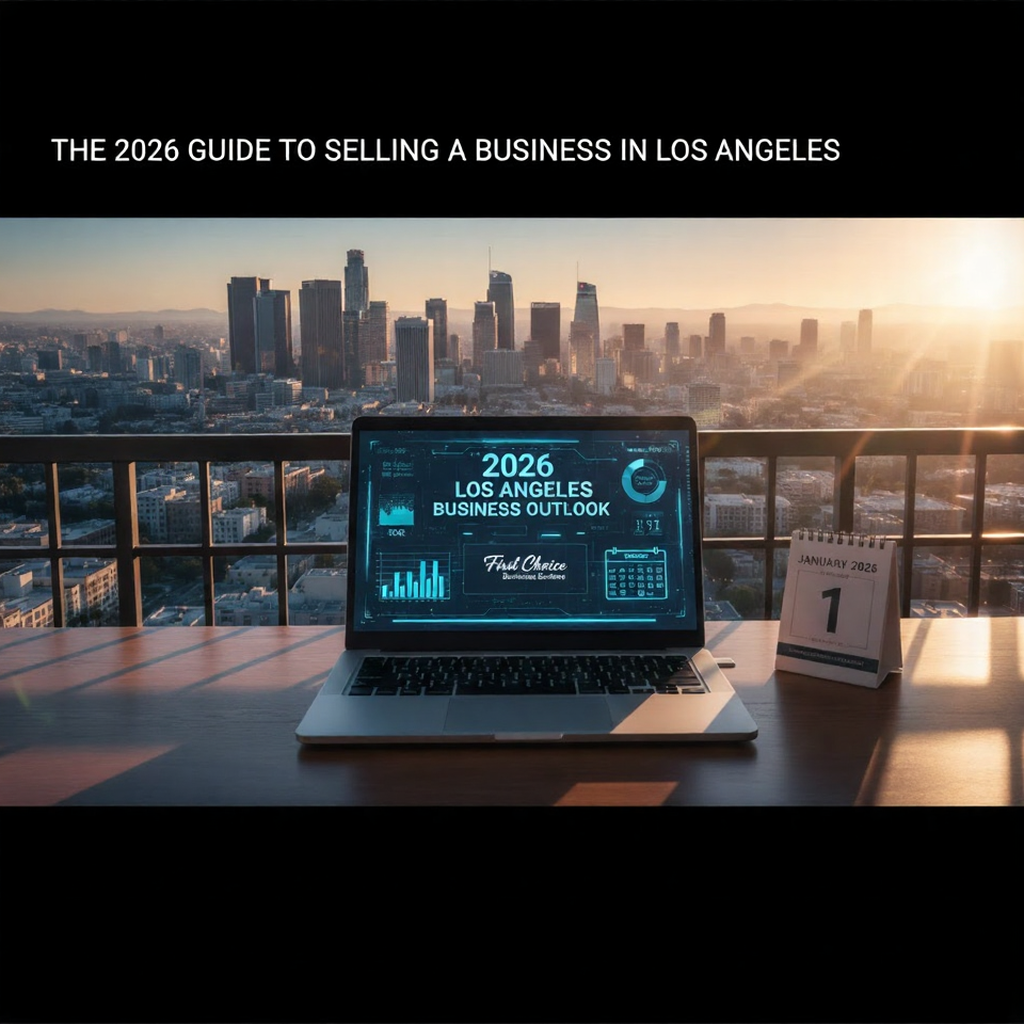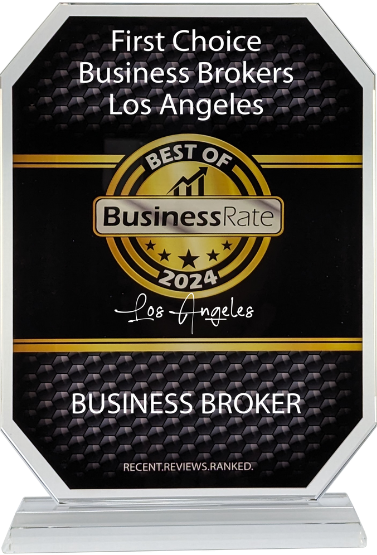Are Business Brokers Worth the Fee? How They Get Paid and Why
Understanding Business Broker Compensation Models
When considering selling your business, one of the first questions is how business brokers get paid. It's not like hiring a lawyer or an accountant who sends you an hourly bill. Instead, their pay is usually tied to whether the sale goes through. This can make you wonder if their fee structure aligns with the value they bring. Understanding these different ways brokers get paid is essential, as it helps you pick a fair payment plan, be transparent about costs, and ultimately keep more of the money you earn from selling your business. At First Choice Business Brokers Los Angeles, we believe in a transparent, commission-only model. This ensures our incentives align perfectly with yours—we only get paid when we successfully sell your business at the highest possible price.
Commission-Only Broker Fee Structures
This is the most common way brokers get paid. With a commission-only setup, the broker isn't paid anything up front. Their fee, a percentage of the final sale price, is only collected once the deal is officially closed. This is the safest bet for business owners trying to sell quickly or watching their budget closely because there's no initial financial commitment. While a commission-only model aligns the broker's success with yours, an experienced and reputable broker is committed to getting you the best possible price, not just a quick one. At First Choice Business Brokers, we aim to maximize your return, not just close a deal.
The Hybrid Model: Retainer Plus Commission
Some brokers use a mix of payment methods. This is often called a hybrid model. It usually involves a smaller upfront fee, sometimes a retainer, plus a commission once the sale is complete. The upfront fee can cover initial costs like marketing your business, preparing sales documents, or doing an initial valuation. It's meant to show you're serious about selling and to cover the broker's basic expenses. The commission part works the same way as the commission-only model – a percentage of the sale price paid at closing. This structure can sometimes motivate the broker to stay engaged throughout the process, as they have some payment regardless of the final sale price, but still have a strong incentive to get the best deal possible.
Evaluating Broker Fee Structures for Value
When looking at how a broker gets paid, it's not just about the percentage or the upfront cost. You need to think about what you're getting for that money. Does the fee structure make sense for your specific business and your goals for selling? Consider these points:
- Alignment of Interests: Does the broker's pay structure encourage them to get you the best possible price and terms, or just to close any deal quickly?
- Risk vs. Reward: Who is taking on more risk? You're taking on more risk if you pay a hefty upfront fee with no sale guarantee. Commission-only models shift more risk to the broker.
- Services Included: What exactly does the fee cover? Ensure you understand what marketing, buyer screening, negotiation, and administrative support are included in their compensation.
It's easy to get caught up in the numbers – the commission percentage or the retainer amount. However, the real question is whether the fee structure reflects the actual work and the potential return the broker can bring to your sale. A broker who charges a bit more but can significantly increase your sale price or speed up the process might be more cost-effective in the long run than one who charges less but doesn't achieve the best outcome.
How Do Business Brokers Get Paid?
When you're preparing to sell your business in Los Angeles, a big question is how business brokers get paid. It makes sense to wonder if their fees are worth it, and understanding their compensation models is key. Most brokers operate on a system where their earnings are tied directly to the sale's success, meaning they don't get paid unless your business is sold. This aligns their interests with yours, as they are motivated to get the best possible price.
The Standard Commission-Based Fee
This is the most common way brokers earn their keep. They charge a percentage of the final sale price of your business. This percentage is typically agreed upon upfront, often between 5% and 10%, though it can vary. The beauty of this model for sellers is that there are usually no upfront costs. You only pay the broker when the deal officially closes. It's a performance-based structure, so the broker is incentivized to work hard to find a buyer and negotiate a good deal, because their payday depends on it.
Upfront Retainers and Monthly Fees
Some brokers, however, might ask for an upfront retainer or a monthly fee. This is often used to cover the initial costs of marketing your business, preparing detailed sales materials, or conducting valuations. Consider it a way to cover the time and resources spent before a sale closes. Sometimes, these fees might be credited back to you at closing, but not always. It's essential to clarify this upfront. This model can provide brokers with a more stable income stream, but for sellers, it means paying for services even if the business doesn't sell.
Success Fees as Performance Incentives
This term is often used interchangeably with commission. Still, sometimes it can refer to a fee structure that rewards a broker for achieving specific goals, like selling the business within a certain timeframe. It's a bonus for hitting targets. While the core idea is similar to commission – payment upon successful sale – a distinct success fee might be structured to encourage a quicker sale or a sale at a particular price point. It's another way to ensure the broker actively works towards a successful outcome that benefits you.
The Value Proposition of Hiring A Broker
Selling a business is a big undertaking, and it's natural to wonder if bringing in a professional is the right move. They have the experience to help you get the best possible outcome for your business. For instance, our extensive network and national reach at First Choice Business Brokers Los Angeles mean we can connect you with a broader pool of pre-qualified buyers—not just local ones—significantly increasing the likelihood of a successful sale at a great price. They also handle much of the heavy lifting, freeing you up to keep your business running smoothly.
Increasing the Likelihood of a Successful Sale
It's a tough market out there, and many businesses that try to sell themselves just don't end up closing the deal. A broker's main job is to sell your business, and they know how to do it. They have established networks and marketing strategies that reach buyers who are serious and qualified. This means fewer tire-kickers and more genuine interest, which naturally boosts your chances of a successful sale.
Protecting Confidential Information and Qualifying Buyers
It's essential to keep the sale of your business quiet. You don't want employees, customers, or competitors to learn about it prematurely. Brokers are skilled at managing this. They create marketing materials that pique interest without giving too much sensitive information. More importantly, they vet potential buyers thoroughly. This means checking their financial capacity, experience, and true intentions. This screening process protects your business and ensures that only serious, capable individuals reach the negotiation table.
Streamlining the Sales Process and Saving Seller Time
Let's be honest, running a business is demanding enough without adding the complexities of a sale. A broker takes on much of the burden. They manage inquiries, schedule meetings, prepare documentation, and handle much back-and-forth communication. This lets you stay focused on day-to-day operations, which are vital for maintaining the business's value during the sale process. They act as a buffer, managing the process efficiently so you don't have to.
A broker's involvement can significantly reduce the stress and time commitment required from the seller, allowing them to concentrate on maintaining business operations and value.
Factors Influencing Broker Fees
The cost of hiring a business broker isn't a one-size-fits-all number. Several elements come into play that can adjust the overall fee you'll pay. Understanding these factors helps you better assess if a broker's fee aligns with the service and potential outcome for your specific situation, especially when looking at businesses for sale in Los Angeles.
Complexity and Size of the Business Transaction
The more intricate a business sale is, the more time and specialized knowledge a broker will need. This can translate into higher fees. Similarly, larger businesses with higher sale prices often command higher commission percentages, reflecting the increased responsibility and potential risk for the broker. A smaller, straightforward business sale might have a simpler fee structure.
Broker Experience and Market Location
Brokers with a proven track record and extensive experience, especially in a competitive market like Los Angeles, are worth the investment. Their established network and history of successful deals justify a higher fee and often lead to a significantly better outcome for you. Newer or less experienced brokers might offer lower rates to build their client base and reputation.
Negotiating Brokerage Fees
Brokerage fees are often negotiable. While many brokers have standard fee structures, sellers can discuss the terms. Factors like the business's sale price, the expected length of the sales process, and the specific services required can all be points of negotiation. Understanding what the fee covers before agreeing to the terms is always a good idea.
It's important to remember that while fees are a consideration, the broker's ability to achieve a successful sale at the best possible price is the primary goal. A slightly higher fee for a highly competent broker often results in a greater net return for the seller.
Potential Drawbacks of Traditional Broker Fees
While hiring a business broker can be smart, it's essential to know the downsides of traditional fee structures. Not all brokers operate with the seller's best interests at the forefront, and some fee models can leave you feeling exposed.
Risk of Rushed or Suboptimal Deal Offers
Because many brokers are paid solely on commission, their income is tied directly to closing a deal. This can incentivize them to push for the first offer rather than holding out for a buyer who might offer a better price or more favorable terms. This can lead to sellers accepting deals that aren't truly optimal for their business's future.
- Brokers might prioritize deals that move quickly, potentially overlooking better opportunities.
- Sellers might feel pressured to accept offers that don't fully reflect their business's value.
- The broker's need to close can conflict with the seller's desire for the best possible outcome.
The pressure to close can sometimes mean that the broker's focus shifts from maximizing the seller's return to simply completing a transaction. This is a critical point to consider when evaluating a broker's motivations.
Uncertainty in Deliverables and Timelines
Traditional fee agreements can sometimes be vague about what exactly the seller is paying for and how long the process is expected to take. This lack of clarity can lead to frustration and a feeling of being in the dark.
- What specific marketing activities will the broker undertake?
- How will potential buyers be vetted and qualified?
- What are the expected milestones and timelines for the sale process?
Without clear answers to these questions, sellers might wait months without significant progress, even if they've paid upfront fees.
Upfront Costs Without Guaranteed Results
Many brokers, including some associated with firms like First Choice Business Brokers Los Angeles, may require upfront retainers or fees. While these are often presented as covering initial marketing and preparation costs, they come with a significant risk for the seller: you pay these fees regardless of whether the business sells. This means a seller could invest a substantial amount of money and still end up with no sale, leaving them out of pocket and potentially in a worse financial position.
- Retainers can range from thousands to tens of thousands of dollars.
- Monthly fees can add up quickly over a prolonged sales process.
- There's no guarantee that these upfront payments will lead to a successful transaction.
Alternative Fee Structures and Modern Approaches
While the traditional commission-based model has long been the standard, the business brokerage landscape is evolving. Sellers are increasingly looking for more flexible and transparent ways to engage brokers, leading to the development of alternative fee structures. These newer approaches aim to better align the broker's incentives with the seller's goals, often reducing the upfront financial burden on the seller and providing clearer value.
Transparent Pricing and Reduced Success Fees
Some modern brokers are moving away from the high percentage-based commissions of the past. Instead, they might offer a more straightforward, lower success fee, perhaps combined with a smaller upfront payment or a flat fee. This transparency helps sellers understand precisely what they're paying for and reduces the risk of a large commission eating into their sale proceeds. It encourages focusing on achieving the best possible deal, not just any deal.
Data-Driven Processes and Expert Support
Another trend is the integration of data analytics and specialized expertise into the brokerage process. At First Choice Business Brokers Los Angeles, we utilize sophisticated market data and valuation tools to provide accurate pricing and identify a wider pool of qualified buyers. This data-driven approach, often supported by specialized marketing, negotiation, and due diligence teams, can justify a fee structure that reflects this enhanced service level.
Eliminating Upfront Retainers for Sellers
One of the most significant shifts is the move towards eliminating or significantly reducing upfront retainer fees for sellers. Traditional models sometimes required sellers to pay a monthly fee regardless of progress, which could be a financial strain. Newer models often structure fees so that most of the payment is contingent on a successful sale. This approach demonstrates the broker's confidence in selling the business. It shifts the financial risk towards the broker, aligning their motivation directly with closing a deal that benefits the seller.
Tax Implications of Broker Fees
Understanding how your fees to business brokers work from a tax perspective is essential when selling your business. It's not always straightforward; you'll want to get this right to avoid surprises. Most of the time, these fees are treated as a cost of selling your business. This means they can often be deducted from your taxes, but there are rules. It's not a free-for-all; the IRS has specific conditions that must be met for these expenses to be considered legitimate deductions. For instance, the fee has to be directly tied to the sale of the business and be a normal, expected cost for a transaction like this. If you're working with business brokers in Los Angeles or anywhere else, keeping detailed records of all payments is always a good idea. This documentation is key if you must prove these expenses to the tax authorities. Think of it like keeping receipts for everything when you're doing your taxes – that kind of diligence pays off.
Broker Fees as Business Sale Expenses
The money you pay to a business broker is viewed as a cost incurred to complete the sale of your company. This falls under the umbrella of 'selling expenses.' These costs are necessary to get the deal done and transfer ownership. For example, if you hire First Choice Business Brokers Los Angeles, their fee is directly associated with the sale process. It’s not an operational expense of the business while it’s running, but rather a cost incurred specifically because you decided to sell.
Consulting Tax Professionals for Deductions
Because tax laws can be complicated and change, it's wise to talk to a tax professional. They can look at your specific situation, understand the details of your business sale, and tell you precisely what you can and can't deduct. They'll know what qualifies as a deductible expense and how to properly report it on their tax returns. Trying to figure this out independently can lead to mistakes, so getting expert advice is usually the best.
Conditions for Tax Deductibility
For a business broker fee to be tax-deductible, a few things generally need to be true:
- Direct Connection: The fee must be directly related to the sale of your business. If the broker did work that wasn't part of the sale, that portion might not be deductible.
- Ordinary and Necessary: The expense must be considered 'ordinary and necessary' for selling a business. This means it's an ordinary expense for business sales and was required to make the sale happen.
- Proper Documentation: You need proof of payment. This includes the agreement with the broker and records showing the money was paid. Without good records, a deduction can be challenged.
- Timing: The deduction is typically taken in the year the sale transaction closes, and the fee is paid. This timing aspect is essential for reporting income and expenses.
Key Takeaways
- Broker fees are typically tied to the success of the sale.
- The right broker provides immense value beyond finding a buyer, including confidentiality, buyer screening, and negotiation expertise.
- A broker’s fee is often a sound investment that leads to a higher net sale price.
- First Choice Business Brokers Los Angeles operates on a transparent model focused on your success, ensuring we are motivated to get you the best possible deal.
Ready to Discuss Your Business Sale?
If you’re considering selling your business, a significant first step is a confidential, no-obligation discussion with a professional. Contact the experts at
First Choice Business Brokers Los Angeles today for a complimentary valuation. We’ll assess your business's market value professionally and discuss how our proven process can help you achieve your goals.







